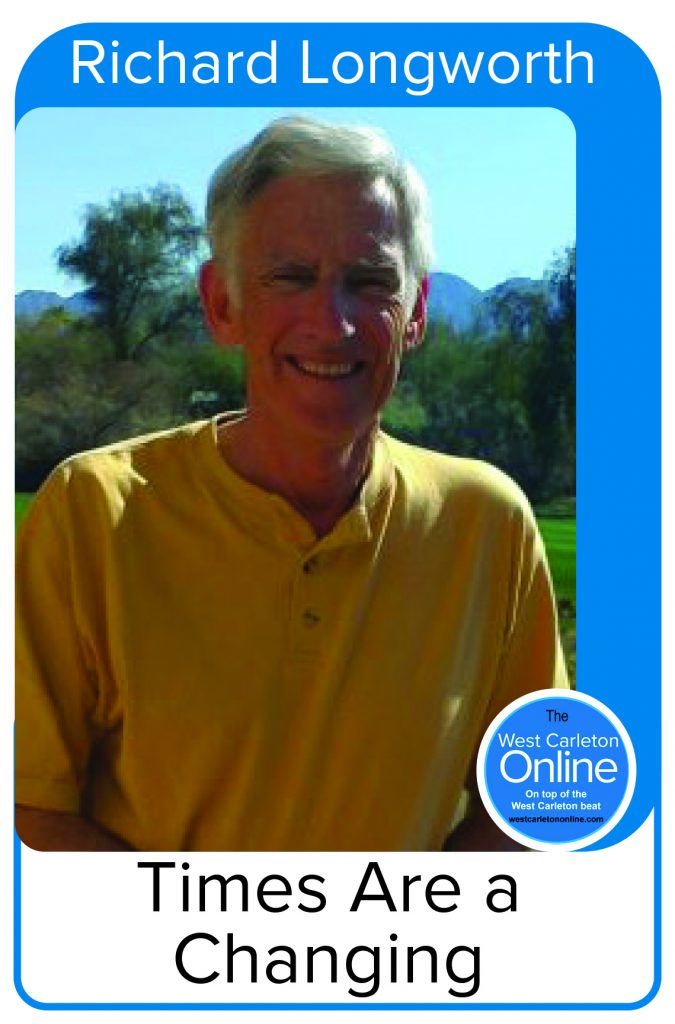Longworth: Learning
By Richard Longworth for West Carleton Online
We cannot teach people anything; we can only help them discover it within themselves.
—Galileo
An often-used saying is, “we can lead a horse to water but we can’t make the horse drink.” In terms of education, we could rephrase this saying and write, “we can provide the environment and opportunity for students to learn, but unless they have the thirst, the students will resist, and the learning will be inconsequential.” Perhaps the most important task for the teacher is to affect the learning, to modify the behavior so the student develops an appetite to learn. Equally, the student has a responsibility. The student, through self-discovery, ensures that the learning is significant.

Educators do not simply need knowledge about their subject matter; they also need knowledge of each student and his/her needs. When teachers act as mentors and facilitators, they influence learning positively. If teaching is to be effective and have any significant impact on the student, there should be a harmonious blend between teaching a subject and teaching a student.
In the circle of learning, good teaching will help someone learn, but ultimately the learner has to be responsible for his/her learning. There is much written on the topic from a learner’s perspective. All students, however, can improve their ability to learn. We will look primarily at the learner’s attitude and behavior.
First, we must accept the educational system as it exists and then look for ways to maximize our learning. Many students at college expend enormous amounts of negative energy complaining about their classmates and instructors, avoiding their homework, and adding barriers to their learning. As an example, consider what happens when we read a book that is of little interest to us. We have to put aside other things, which are probably far more appealing. We procrastinate, become annoyed, stress out — all negative emotional responses. Eventually, through effort and concentration, we recognize and complete the task — accept what is. Once we accept what has to be done, our mind relaxes, positive energy replaces negative feelings, and learning becomes a new adventure. Over time, we may even find joy in what we are doing. Our new mind-set suggests learning requires much less effort than we originally believed, and we are able to complete the task successfully. We can extend this further into everything we do—not only tasks related to school, but tasks in other life situations.
In summary, caring teachers who affectively connect with their students, and learners who have a positive attitude toward learning, can create a bridge that links an enthusiastic learner with the joy of learning.
Personal reflections
One of the primary goals of education is to modify a student’s behavior so learning becomes a positive experience. A student, however, cannot be simply willed to accept the teaching and possibly change his/her attitude toward learning. Each term, I start a new semester with a course outline. In broad terms, I inform my class what will be covered and state my expectations of the class and of each student. I notice some of my students react emotionally — they appear shocked and go into avoidance mode. These students seem to be thinking, “you can’t be serious, there is no way I am going to …” or, “let me out of this class. I want to talk to the department head.”
If this student continues with the course, I often notice they test my resolve and often complain to me, “I have five quizzes, four papers, three presentations, two meetings, and a partridge to take care of next week. How can you expect my project at the same time?”
Be assured, most instructors have heard it all. The next stage I notice is eventual surrender and acceptance. “This teacher is not yielding to my complaints. I guess I’d better do it.”
If they stick with it, amazing things will happen. Initially, the student struggles, but then s/he gains confidence and experiences success and a good feeling. Often the student admits, “it wasn’t bad, after all. Why did I resist in the first place?” Self-discovery takes place. Indeed, a positive outcome. Of course, educators can help students overcome a negative attitude toward the course, but how much more effective would it be if the student became aware of the stages of his/her own resistance, accepted responsibility for the workload, and got down to being productive?
What does this have to do with me?
This chapter identifies two key elements of an educational process and describes how they affect the student in a traditional school. The first deals with pedagogy (the delivery of knowledge), and the second one focuses on the learner (the recipient of knowledge).
Caring instructors who can affectively implement the curriculum and students who have a positive attitude toward the learning environment are the hallmark of effective learning. As a student, you can do much to enhance the learning environment. Accept the conditions but be cognizant of what is lacking. Work to your full potential. Try the new mind-set approach mentioned above. Enjoy the adventure of learning. This approach will add much, not only to your schooling, but to your life skills.
Based on the discussion in this chapter, we now know the importance of acceptance and an open mind. If we give our full attention to learning, the learner and learning blend harmoniously into a unified whole — the learner and the learning become one and the same. We also know what happens if we resist — we separate the learner from the content of learning. We assume, too, that if our learning is significant (i.e., the learning is not just fact-based but is integrated and affects the overall well-being and behavior of the learner), it will complement the learner’s needs.
To read all Richard Longworth’s columns, click here.
For 40 years Richard Longworth worked as a systems analyst and university professor at Capilano University teaching math, information technology, and system analysis and implementation. Longworth has published three books: Reflections on Life Issues, Turning the Self Inside Out, and Harnessing the Internet into a Knowledge Framework – all related to technology and trends in the industry.












